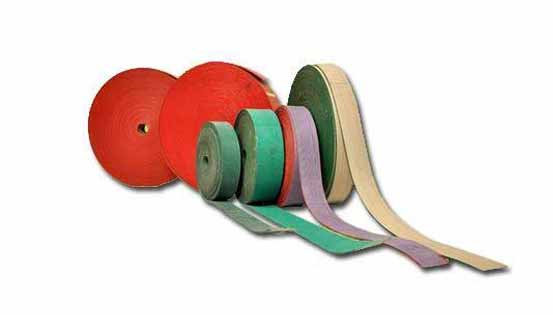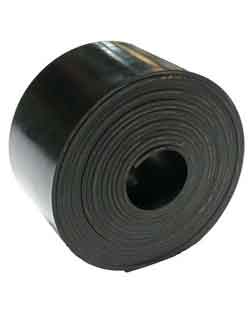Flat Belts are utilized in various applications, especially for driving machines in industries. Flat belts are made of various materials like rubber, leather etc. In some cases they are reinforced with metal, textiles and fibers. Rubber is a popular material used in the making of flat belts. These belts are highly convenient and reliable in operation and installation and are used in high-speed, low-power applications. They are generally used in textile manufacturing machines, paper making machines and conveyors. They have durable surface coatings which provide anti-static properties and withstand high tension and cost-effective.
Classifications of flat belts
Based on their design, rubber flat belts are classified as follows:
- Stretch
- Semi-stretch
- Non-stretch belts
- Urethane rubber
- Neoprene elastomer
- Hypalon
- Ethylene Propylene Diene Monomer (EPM, EPDM)
- Silicone Rubber (SiR)
- Small woven endless belts: Suitable for applications in which less vibration is produced near the driven pulley. These belts are designed as elastic belts, semi-elastic belts and non-stretch belts.
- Higher power flat belts: They are made up of abrasion-resistant rubber. This eliminates the high tension applied to grip pulleys.


Following are the specifications of Flat Belts:
- Working Load: The maximum weight or mass that a belt can support which is expressed in pounds.
- Length: This is the linear distance measured from one end of the belt to the other and expressed in inches or millimeters.
- Weight: This refers to the heaviness of the flat belt and expressed in kilograms or pounds.
- Thickness: This is the distance between two surfaces of a rubber flat belt and expressed in millimeters or inches.
- No requirement of lubrication.
- Maintenance is minimal.
- Reduction of sudden shocks or changes in loading.
- Quiet and smooth operation.
- Conveyors
- Compressors
- Paper making machines
- Textile machinery
- Hard disk drives
- High speed motors
- Heavy industrial devices and Machine tools.
- Anti Vibration Mountings
- Automobile Rubber Products
- Calendered Rubber Products
- Extruded Rubber Products
- Medical Rubber Products
- Metal Bonded Components
- Rubber Adhesives & Sealants
- Rubber Ball
- Rubber Bands
- Rubber Beading
- Rubber Bearing
- Rubber Belt
- Rubber Buckets
- Rubber Bullets
- Rubber Cable
- Rubber Coating
- Rubber Duct
- Rubber Expansion Joints
- Rubber Flooring/Matting
- Rubber Footwear
- Rubber Gloves
- Rubber Injection Parts
- Rubber Lining
- Rubber Magnets
- Rubber Molded Products
- Rubber Pads
- Rubber Rollers
- Rubber Stopper
- Rubber Suit
- Rubber Track
- Rubber Valve
- Rubber Balloon
- Rubber Stamps
- Rubber Fenders
- Acrylic Rubber (ACM)
- Butadiene Rubber (BR)
- Butyl Rubber (IIR)
- Chlorosulfonated Polyethylene(CSM)/ Hypalon
- Ethylene Propylene Diene Monomer
- Fluoroelastomers (FKM)/Viton
- Isoprene Rubber (IR)
- Nitrile Rubber (NBR)
- Perfluoroelastomer (FFKM)
- Polychloroprene (CR)/Neoprene
- Polysulfide Rubber (PSR)
- Silicone Rubber (SiR)
- Styrene Butadiene Rubber
How to Make a Custom Rubber Stamp?
Whenever designing a custom stamp for your company, never compromise on its quality because in the end it is the most...
Read MoreLatex and Silicone Rubber Tubing - A Comparison!
Many industries use rubber tubing for various purposes. In fact, various types of rubber tubing are used for different applications...
Read MoreSilicone vs Acrylic Adhesive- A Comparison
Silicon and acrylic adhesives are those rubber adhesives that are widely used in Polyimide tapes. In fact, the polyimide...
Read More

